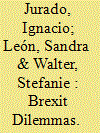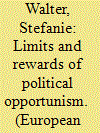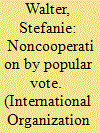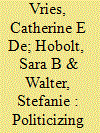|
|
|
Sort Order |
|
|
|
Items / Page
|
|
|
|
|
|
|
| Srl | Item |
| 1 |
ID:
186187


|
|
|
|
|
| Summary/Abstract |
How do voters want their governments to respond when another country unilaterally withdraws from an international institution? We distinguish between negotiation approaches that vary in the degree to which they accommodate the withdrawing state's demands and argue that negotiation preferences are shaped by two issues. The first is voters’ exposure to the costs and benefits of accommodation. This exposure varies across issues, and we argue that citizens will generally prefer non-accommodation on zero-sum issues, but support more accommodation on cooperation issues, where non-accommodation puts existing cooperation gains at risk. Second, withdrawal negotiations create precedents, and citizens should therefore be less willing to accommodate the more they are concerned about the ripple effects of accommodation on the institution's stability. These concerns also confront citizens with two types of dilemmas depending on how favorably they view the institution themselves. To test our argument, we use survey evidence and a conjoint experiment conducted in Germany and Spain during the Brexit negotiations. We find that respondents overall are more willing to accommodate the UK on cooperation issues than on zero-sum issues, but also find evidence that Euroskeptics and Europhiles confront different issue-specific dilemmas. Our paper contributes to a better understanding of the dynamics surrounding the challenges to multilateralism that have proliferated in recent years.
|
|
|
|
|
|
|
|
|
|
|
|
|
|
|
|
| 2 |
ID:
096690


|
|
|
|
|
| Publication |
2010.
|
| Summary/Abstract |
From the earliest years of the Internet's creation, cyberspace has been distinguished from other types of political space because of three unique qualities: (i) its ability to mobilize users, particularly "outsiders" including those who have not been easily included in political systems using conventional means; (ii) its ability to quickly provide large quantities of information of uncertain or unregulated quality; and (iii) its ability to shrink distances between users, in some sense rendering conventional physical geography irrelevant. This paper presents three lenses for interpreting the significance of these developments: utopian, liberal, and realist. Evolving doctrines of cyberwarfare as put forth by China, Russia, and the United States in particular stress the ways in which cyberspace presents a unique security threat which may present greater advantages to nonstate actors engaged in unconventional warfare. Differing economic, political, and security policies derive from each lens.
|
|
|
|
|
|
|
|
|
|
|
|
|
|
|
|
| 3 |
ID:
086992


|
|
|
|
|
| Publication |
2009.
|
| Summary/Abstract |
Politicians are often assumed to be opportunistic. This article examines both whether there is a limit to this opportunism and whether voters reward policy makers for opportunistic behaviour. By looking at currency crisis situations, the article presents a graphic rational opportunistic political business cycle model in which incumbents face a tradeoff between their wish to signal competence and the economic constraints imposed by the crisis. It analyses how electoral incentives affect policy makers' management of currency crises and how this management in turn affects the subsequent election outcome. The empirical results of probit models with selection using a sample of 122 crises in 48 industrial and developing countries between 1983 and 2003 confirm the model's prediction that under certain circumstances some types of policy makers do indeed have incentives to deviate from optimal policy in the run-up to elections - and that voters reward this behaviour by re-electing policy makers who follow such strategies. However, there is a limit to the readiness to manipulate: when speculative pressure is too severe, incumbents no longer manipulate policy but implement the least painful policy option instead.
|
|
|
|
|
|
|
|
|
|
|
|
|
|
|
|
| 4 |
ID:
162519


|
|
|
|
|
| Summary/Abstract |
When popular referendums fail to ratify new international agreements or succeed in reversing existing ones, it not only affects domestic voters but also creates negative spillovers for the other parties to such agreements. We explore how voters respond to this strategic environment. We use original survey data from a poll fielded just one day before the 2015 Greek bailout referendum—a referendum in which the stakes for other countries were particularly high—to investigate how expectations about the likely foreign response to a noncooperative referendum outcome influence voting behavior and to what extent foreign policymakers can influence those expectations. Our analysis of the Greek referendum shows that such expectations had a powerful effect on voting behavior: voters expecting that a noncooperative referendum outcome would force Greece to leave the eurozone were substantially more likely to vote cooperatively than those believing that it would result in renewed negotiations with the country's creditors. Leveraging the bank closure that took place right before the vote, we also show that costly signals by foreign actors made voters more pessimistic about the consequences of a noncooperative vote and substantially increased the share of cooperative votes.
|
|
|
|
|
|
|
|
|
|
|
|
|
|
|
|
| 5 |
ID:
178556


|
|
|
|
|
| Summary/Abstract |
International institutions are increasingly being challenged by domestic opposition and nationalist political forces. Yet, levels of politicization differ significantly across countries facing the same international authority as well as within countries over time. This raises the question of when and why the mass public poses a challenge to international cooperation. In this article, we develop a theoretical framework for understanding the nature and implications of politicization of international cooperation, outlining three scope conditions: the nature of public contestation, the activities of political entrepreneurs, and the permissiveness of political opportunity structures. By empirically examining these scope conditions, we demonstrate that politicization can have both stabilizing and destabilizing effects on international cooperation. Highlighting the systemic implications of politicization for international cooperation has important implications for international relations scholarship. Although international organizations may face challenges, they also have ways of being remarkably resilient.
|
|
|
|
|
|
|
|
|
|
|
|
|
|
|
|
|
|
|
|
|